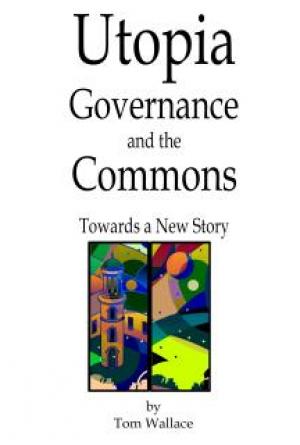The Travels of Marco Polo and the Silk Roads
Marco Polo was a merchant from Venice. He is one of the most famous merchants in history due to the writings he left about his travels at the Silk Roads.
Map 1
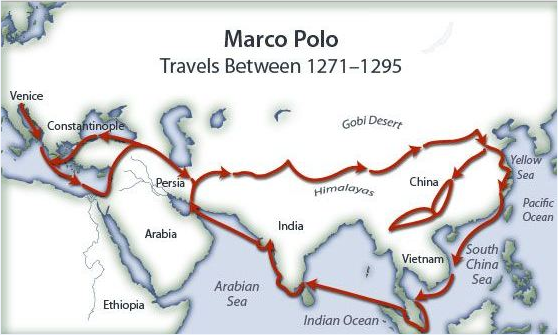
https://s-media-cache-ak0.pinimg.com/736x/27/52/04/275204dbb9453269e71d405b236bfb26.jpg
The following map from Wikipedia shows the trade routes followed by Marco Polo.
Map 2
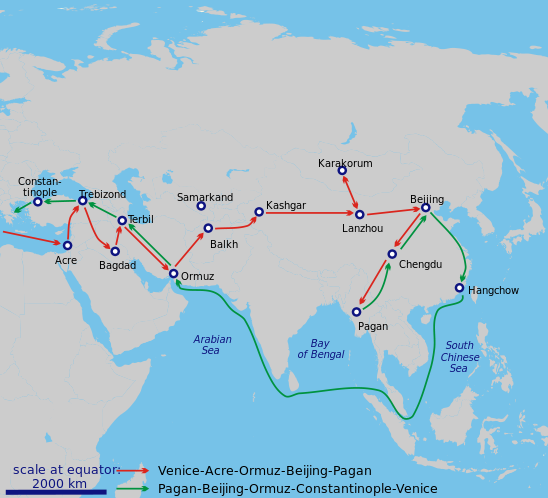
https://en.wikipedia.org/wiki/The_Travels_of_Marco_Polo#/media/File:Travels_of_Marco_Polo.svg
For centuries Venice was the dominant naval and commercial power at the Mediterranean Sea. Most of the spice trade was carried out by the Merchants of Venice in the Mediterranean Sea. The Muslims would bring the merchandises to Egypt, and from there the merchants of Venice would transfer them to Europe.
Map 3
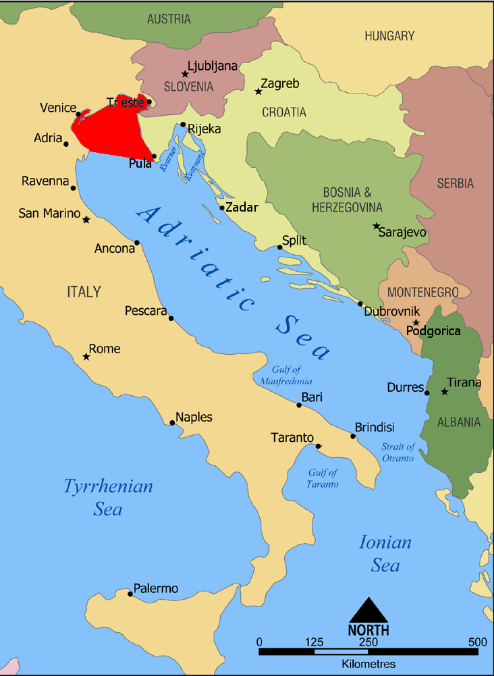
https://upload.wikimedia.org/wikipedia/commons/a/a7/Mapa_-_Adriatic_Sea_map_-_Gulf_of_Venice.PNG
The riches of Venice to a large extent were generated by the Silk Roads and the Spice Trade. The Venetians would buy the spices from Alexandria (Egypt), and if they managed to safely return home they would sell them at a price at least five times higher.
Image 1 Venice
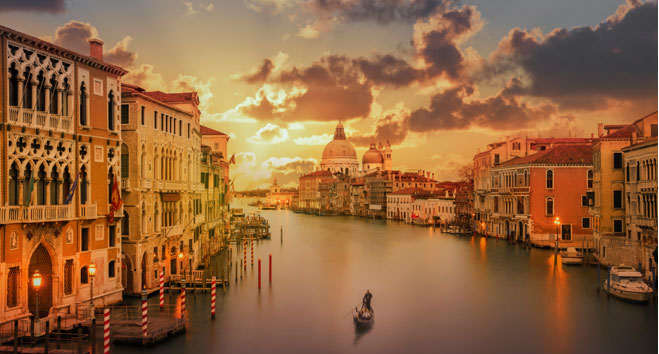
http://cdn.ek.aero/pl/Polish/images/Venice_tcm558-2437263.jpg
I was saying in my previous post that following the death of Muhammad the Prophet, the Iron Curtain of Islam was erected in the 7th and 8th centuries in front of the Europeans, and the Europeans were no longer allowed to reach the Indian Ocean. They would have to buy the merchandises of Asia from the Muslim traders in Egypt. See “The Islamic Iron Curtain of the 7th Century”.
http://iakovosal.blogspot.gr/2016/04/7.html
Map 4
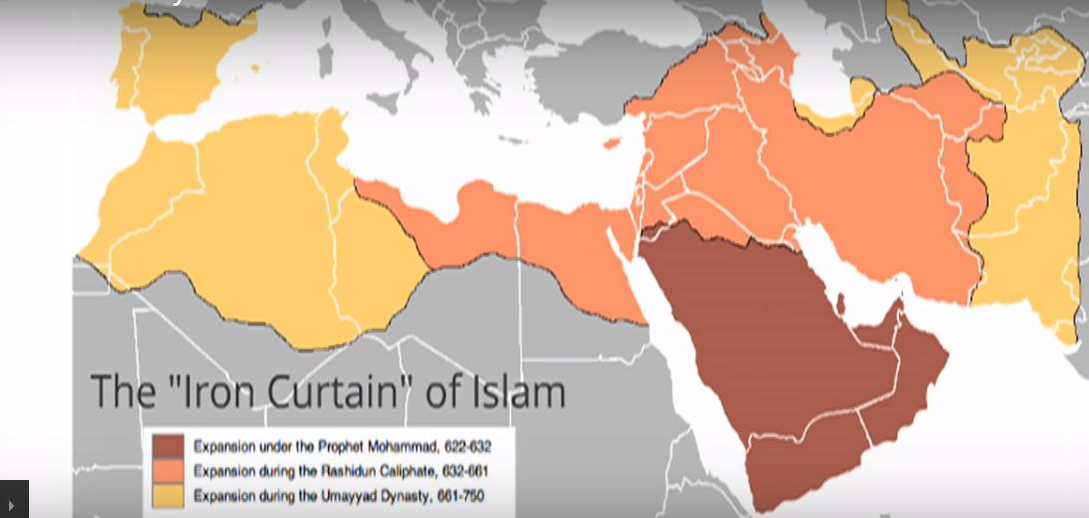
https://upload.wikimedia.org/wikipedia/commons/thumb/7/72/Map_of_expansion_of_Caliphate.svg/2000px-Map_of_expansion_of_Caliphate.svg.png
Map 5
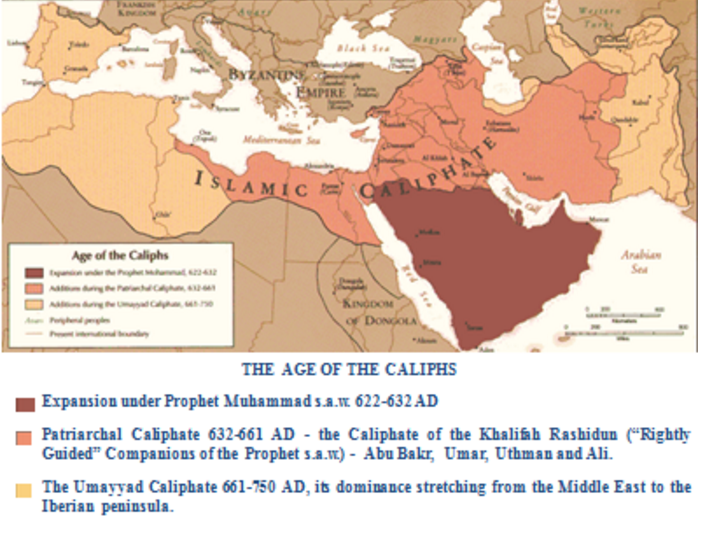
http://2.bp.blogspot.com/-SzB_IoOo9Ig/TlpJeqKeyVI/AAAAAAAAAUA/x_K8gMtt1Dc/s1600/age+of+caliphs+2.png
Things changed when the Mongols, who were non-Muslim populations, beat the Muslims and established their own empire.
Map 6
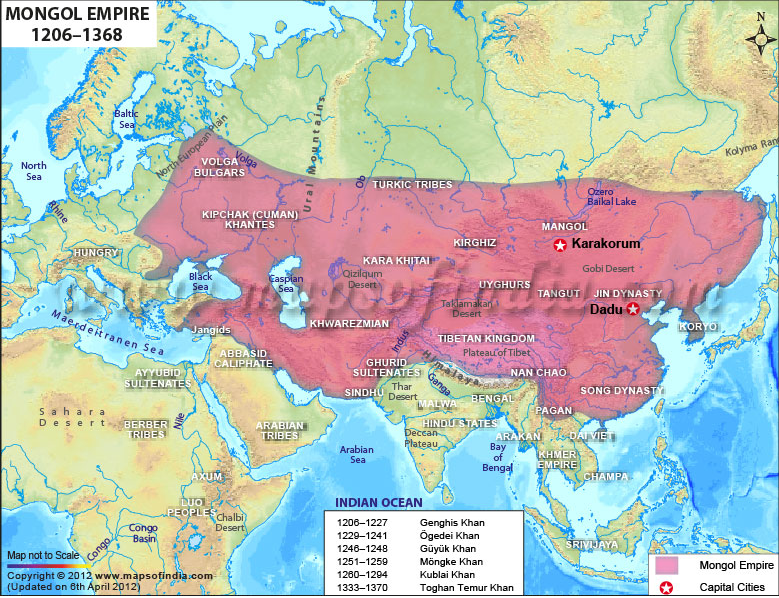
http://www.mapsofindia.com/history/mongol-dynasty-map.jpg
For some reasons the Mongols allowed the Europeans to use the Silk Roads. Maybe because the Islamic Caliphate, which was standing between the Europeans and the Mongols, was perceived by them as a common enemy. I don’t really know. However it was during the Mongol period that Marco Polo traveled at the Silk Roads. Therefore the Mongols, even though very barbaric, allowed the Westerners to reach Asia once more.
However after the death of Genghis Han, who was the leader of the Mongols, the Mongols were gradually converted to Islam, and their empire was replaced by the Ottoman Empire. When in 1453 the Ottomans took over Constantinople i.e. Istanbul, they obtained full control of the Silk Roads, and they started using monopolistic methods again, and that created tensions with the Europeans. There were even wars between the Venetians and the Ottomans i.e. see “Ottoman-Venetian Wars”.
Map 7
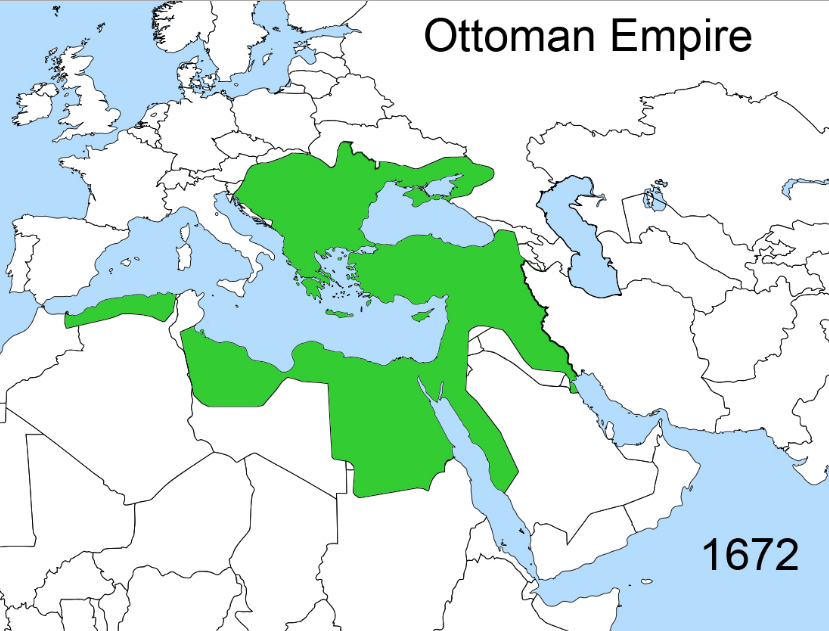
https://upload.wikimedia.org/wikipedia/commons/0/09/Territorial_changes_of_the_Ottoman_Empire_1672.jpg
Due to the great naval power of the Venetians, and the Muslim blockade at Egypt, the other Europeans were looking for ways to achieve more favorable terms of trade, in order to avoid the taxes and commissions of the Muslims and the Venetians. In an effort to find an alternative route for the Spanish, the Italian explorer Christopher Columbus discovered America in 1492. In 1497 the Portuguese explorer Vasco da Gama managed to sail around Africa and reach India.
Articles
“Spice Trade”
13th Paragraph
From there, overland routes led to the Mediterranean coasts. From the 8th until the 15th century, the Republic of Venice and neighboring maritime republics held the monopoly of European trade with the Middle East. The silk and spice trade, involving spices, incense, herbs, drugs and opium, made these Mediterranean city-states phenomenally rich. Spices were among the most expensive and in-demand products of the Middle Ages, used in medicine. They were all imported from Asia and Africa. Venetian merchants distributed then the goods through Europe until the rise of the Ottoman Empire, that eventually led to the fall of Constantinople in 1453, barring Europeans from important combined land-sea routes.
https://en.wikipedia.org/wiki/Spice_trade
“Silk Road”
37th, 38th Paragraph
The Mongol expansion throughout the Asian continent from around 1207 to 1360 helped bring political stability and re-established the Silk Road (via Karakorum). It also brought an end to the dominance of the Islamic Caliphate over world trade. Because the Mongols came to control the trade routes, trade circulated throughout the region, though they never abandoned their nomadic lifestyle.
The Mongol diplomat Rabban Bar Sauma visited the courts of Europe in 1287–88 and provided a detailed written report to the Mongols. Around the same time, the Venetian explorer Marco Polo became one of the first Europeans to travel the Silk Road to China. His tales, documented in The Travels of Marco Polo, opened Western eyes to some of the customs of the Far East. He was not the first to bring back stories, but he was one of the most widely read. He had been preceded by numerous Christian missionaries to the East, such as William of Rubruck, Benedykt Polak, Giovanni da Pian del Carpine, and Andrew of Longjumeau. Later envoys included Odoric of Pordenone, Giovanni de' Marignolli, John of Montecorvino,Niccolò de' Conti, and Ibn Battuta, a Moroccan Muslim traveller who passed through the present-day Middle East and across the Silk Road from Tabriz between 1325–54.
https://en.wikipedia.org/wiki/Silk_Road














